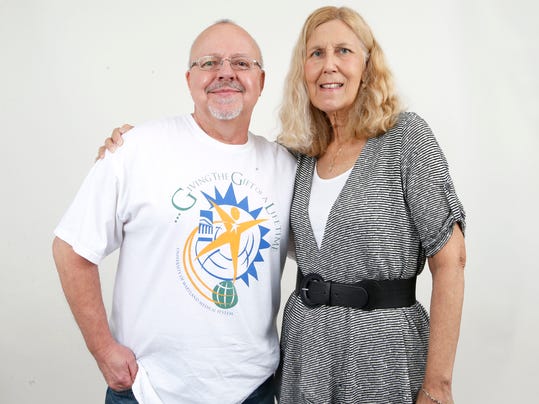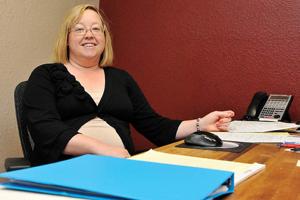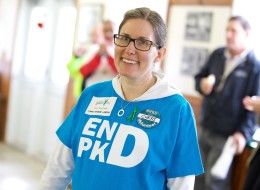From New Delhi TV

A kidney weighing 2.75 kg, claimed to be the world's largest, has been removed from a 45-year-old patient, the authorities at a hospital in Delhi where the operation was performed said on Tuesday.
Subash Yadav was suffering from autosomal dominant polycystic kidney disease (ADPKD) for a couple of years and was admitted to the Sir Ganga Ram hospital (SRGH) last month following chronic renal failure with severe pain in abdomen and blood in urine.
According to hospital authorities, the case was analysed closely and a decision was taken to remove both of his kidneys and transplant new ones. Also the other reason was the deteriorating condition despite being admitted to the hospital.
The doctors remove the 2.75 kg kidney after a three-hour-long surgery.
"We found the procedure quite challenging. Normal kidneys weigh 130 grams approximately. This kidney weighed 2.75 kg which is 20 times more and was stuck to the surrounding intestines," said Manu Gupta, consultant urological surgeon at SGRH and who performed the surgery.
"Even the second kidney of the patient also weighed 2.5 kg and had to be removed in another surgery a week later," Mr Gupta said and added that altogether, the patient's body was bearing an extra weight of about 5 kg.
Mr Gupta said that the dimensions of this huge kidney were 33 X 20 X 20 cm. This happens to be the largest kidney removed to date in the world.
The Guinness Book of World Records reports a kidney weighing 2.15 kg as world's largest kidney till now which was removed in Dhule, Maharashtra in 2011. The dimensions of that kidney were 33.72 X 14.14 X 15.05 cm.
Vinant Bhargav, consultant nephrologist at the hospital said that pre-transplant nephrectomies (removal of kidneys) is occasionally necessary in such situations.
"The patient is recovering well now and awaiting kidney transplant," he told IANS.
From Shelbyville Times-Gazette, By JOHN I. CARNEY, Tennessee
McTigue remains positive despite waiting, setbacks

When Brad McTigue's phone rings, and the Caller ID is either "Vanderbilt" or "Indiana," he has to be ready to drop everything. What that call means is that there's a possible match for a life-saving kidney transplant.
That call has come nine times -- and, nine times, Brad has been disappointed. Six of those nine times, the donor turned out to have health problems. One motorcycle accident victim turned out to have undiagnosed tuberculosis. A potential live donor had breast cancer. McTigue's own brother-in-law flew in from Hawaii, and he and McTigue drove up to Indiana for the transplant, only to discover that the brother-in-law also had a kidney disease.
Lost chance
Last year, though, was the cruelest disappointment of all. A friend of a friend who was an organ donor had passed away, and appeared to be a good match. Doctors harvested and transplanted six different organs, the last of which was the kidney meant for Brad McTigue. It took all day on March 31, and when he looked at the clock he realized it was after midnight -- April Fool's Day.
The donated kidney failed, within a day of the transplant. They originally assumed it was a problem with the organ, but it now appears to have been an artery that was kinked during the transplant surgery.
McTigue tries to stay positive, but describes that experience as "a cruel April Fool's joke."
Fewer matches
Now, he's gone back to waiting. To make matters worse, the anitbodies his body generated, in misguided self-defense, during the failed transplant make it harder to find a compatible match.
It all started when Brad was 20 and his father was diagnosed with polycystic kidney disease, or PKD, which refers to the formation of multiple cysts in the kidney, interfering with its function. The disease is hereditary, so Brad was immediately tested.
"I started seeing a nephrologist when I was 20," he said.
Brad's kidneys weigh 15 pounds each.
"I've never met you," one doctor told him, "but you have the biggest kidneys I've ever seen."
Seeking transplant
In March 2013, after years of care, he made the decision to begin seeking a transplant. He went onto Vanderbilt University Medical Center's transplant list in 2013 and onto Indiana University's in 2014.
While the road to this point has been frustrating, McTigue takes solace in the incredible support he's received from his wife Andrea and from his in-laws. There are two online sites seeking potential donors and informing friends and family of Brad's progress. Andrea has created a Facebook page, Team Brad. Brad's older sister, Susan Clark, is active in the National Kidney Foundation and has created the webpage "Batting For Brad," a reference to McTigue's work as a softball umpire. He said she has gotten so agitated at the false alarms that the family has stopped letting her know about prospective transplants before they've been checked out.
Sudden difference
McTigue drove to Susan's house in Alexandria, Va., last May to attend the National Kidney Walk, but he was unable to walk -- he was still recuperating from the failed surgery in April and unable to walk because blood vessels in his legs had been damaged during the surgery. A few weeks later, in June, he had stints put in his legs, which had an overnight positive impact.
"The next day, I walked a mile," he said. "That's how much of a difference it made."
Brad also gets encouragement from the number of live donors who are willing to consider giving up one of their two kidneys. Vanderbilt has told him that they've never had another patient generate as many phone calls from potential donors.
"My support is incredible," he said. [Read more]
From Cyprus Mail, By Bejay Browne
Working overtime to upgrade kidney treatment

THE NUMBER of patients in need of life saving dialysis treatment at Paphos renal unit saw a huge increase in the first two months of the year.
According to the chairman of the Cyprus Kidney Association-Paphos, there is usually around a twenty per cent increase in patients year on year, but during the first two months of 2015 alone numbers increased by ten per cent.
According to Graham Brown 2,500 people in Paphos need dialysis imminently and 5,000 with kidney problems attend the kidney outpatient unit.
The prevalence of thalassemia, an inherited genetic disease, passed on from parents to children is one reason why the demand for dialysis is high in Cyprus. This blood disorder is three times more prevalent in Cypriots than elsewhere. It is also due to modern living, he noted.
“Our way of life means that our bodies are not able to cope with all of the toxins we are putting in them – from processed foods, shampoos, sun cream and so on. All of these are chemicals,” he said.
He went on to explain that there are only three ways in which a body can get rid of toxins, through the kidneys, liver and sweat glands.
“There are 82,000 Cypriots affected by kidney disorders and 32, 000 are predicted to need dialysis treatment before they are 70,” he said.
Increasing numbers of patients and his own need for regular lifesaving dialysis, is keeping Brown focused on improving facilities available at Paphos Renal Unit,. Since June 2014, the association and its supporters have raised in excess of 60,000 euros. Some of this has been used to replace old and ageing machines, purchase a number of chair beds at a cost of 3,500 each and also to allow for a small extension to the unit.
“We have completed a small extension, by knocking through walls, so that three more machines have been put in. This will enable 15 more patients to be treated. The bed chairs are due to arrive from Portugal in two weeks’ time,” he added.
Brown, 65, only took over as chairman of the association in April 2014, determined to raise the profile of the charity. He was diagnosed with a hereditary condition of polycystic kidney disease and following the removal of one of his kidneys at a Paphos hospital, he started dialysis treatment at the general in November 2013.
He is now one of many patients who need regular dialysis treatment for five hours, three times a week, to keep him alive.
Brown pointed out that the association has recently changed its name and logo from Cyprus Kidney Association Expats to The Cyprus Kidney Association Paphos, to reflect the work they undertake.
“We changed our name and logo on World Kidney Day – March 12 – as people were asking why is it only for expats. But it’s not, it’s for everyone.” [Read more]
From Tallahassee Democrat, Florida, by Karl Etters Democrat staff writer
Subash Yadav was suffering from autosomal dominant polycystic kidney disease (ADPKD) for a couple of years and was admitted to the Sir Ganga Ram hospital (SRGH) last month following chronic renal failure with severe pain in abdomen and blood in urine.
According to hospital authorities, the case was analysed closely and a decision was taken to remove both of his kidneys and transplant new ones. Also the other reason was the deteriorating condition despite being admitted to the hospital.
The doctors remove the 2.75 kg kidney after a three-hour-long surgery.
"We found the procedure quite challenging. Normal kidneys weigh 130 grams approximately. This kidney weighed 2.75 kg which is 20 times more and was stuck to the surrounding intestines," said Manu Gupta, consultant urological surgeon at SGRH and who performed the surgery.
"Even the second kidney of the patient also weighed 2.5 kg and had to be removed in another surgery a week later," Mr Gupta said and added that altogether, the patient's body was bearing an extra weight of about 5 kg.
Mr Gupta said that the dimensions of this huge kidney were 33 X 20 X 20 cm. This happens to be the largest kidney removed to date in the world.
The Guinness Book of World Records reports a kidney weighing 2.15 kg as world's largest kidney till now which was removed in Dhule, Maharashtra in 2011. The dimensions of that kidney were 33.72 X 14.14 X 15.05 cm.
Vinant Bhargav, consultant nephrologist at the hospital said that pre-transplant nephrectomies (removal of kidneys) is occasionally necessary in such situations.
"The patient is recovering well now and awaiting kidney transplant," he told IANS.

That call has come nine times -- and, nine times, Brad has been disappointed. Six of those nine times, the donor turned out to have health problems. One motorcycle accident victim turned out to have undiagnosed tuberculosis. A potential live donor had breast cancer. McTigue's own brother-in-law flew in from Hawaii, and he and McTigue drove up to Indiana for the transplant, only to discover that the brother-in-law also had a kidney disease.
Lost chance
Last year, though, was the cruelest disappointment of all. A friend of a friend who was an organ donor had passed away, and appeared to be a good match. Doctors harvested and transplanted six different organs, the last of which was the kidney meant for Brad McTigue. It took all day on March 31, and when he looked at the clock he realized it was after midnight -- April Fool's Day.
The donated kidney failed, within a day of the transplant. They originally assumed it was a problem with the organ, but it now appears to have been an artery that was kinked during the transplant surgery.
McTigue tries to stay positive, but describes that experience as "a cruel April Fool's joke."
Fewer matches
Now, he's gone back to waiting. To make matters worse, the anitbodies his body generated, in misguided self-defense, during the failed transplant make it harder to find a compatible match.
It all started when Brad was 20 and his father was diagnosed with polycystic kidney disease, or PKD, which refers to the formation of multiple cysts in the kidney, interfering with its function. The disease is hereditary, so Brad was immediately tested.
"I started seeing a nephrologist when I was 20," he said.
Brad's kidneys weigh 15 pounds each.
"I've never met you," one doctor told him, "but you have the biggest kidneys I've ever seen."
Seeking transplant
In March 2013, after years of care, he made the decision to begin seeking a transplant. He went onto Vanderbilt University Medical Center's transplant list in 2013 and onto Indiana University's in 2014.
While the road to this point has been frustrating, McTigue takes solace in the incredible support he's received from his wife Andrea and from his in-laws. There are two online sites seeking potential donors and informing friends and family of Brad's progress. Andrea has created a Facebook page, Team Brad. Brad's older sister, Susan Clark, is active in the National Kidney Foundation and has created the webpage "Batting For Brad," a reference to McTigue's work as a softball umpire. He said she has gotten so agitated at the false alarms that the family has stopped letting her know about prospective transplants before they've been checked out.
Sudden difference
McTigue drove to Susan's house in Alexandria, Va., last May to attend the National Kidney Walk, but he was unable to walk -- he was still recuperating from the failed surgery in April and unable to walk because blood vessels in his legs had been damaged during the surgery. A few weeks later, in June, he had stints put in his legs, which had an overnight positive impact.
"The next day, I walked a mile," he said. "That's how much of a difference it made."
Brad also gets encouragement from the number of live donors who are willing to consider giving up one of their two kidneys. Vanderbilt has told him that they've never had another patient generate as many phone calls from potential donors.
"My support is incredible," he said. [Read more]

THE NUMBER of patients in need of life saving dialysis treatment at Paphos renal unit saw a huge increase in the first two months of the year.
According to the chairman of the Cyprus Kidney Association-Paphos, there is usually around a twenty per cent increase in patients year on year, but during the first two months of 2015 alone numbers increased by ten per cent.
According to Graham Brown 2,500 people in Paphos need dialysis imminently and 5,000 with kidney problems attend the kidney outpatient unit.
The prevalence of thalassemia, an inherited genetic disease, passed on from parents to children is one reason why the demand for dialysis is high in Cyprus. This blood disorder is three times more prevalent in Cypriots than elsewhere. It is also due to modern living, he noted.
“Our way of life means that our bodies are not able to cope with all of the toxins we are putting in them – from processed foods, shampoos, sun cream and so on. All of these are chemicals,” he said.
He went on to explain that there are only three ways in which a body can get rid of toxins, through the kidneys, liver and sweat glands.
“There are 82,000 Cypriots affected by kidney disorders and 32, 000 are predicted to need dialysis treatment before they are 70,” he said.
Increasing numbers of patients and his own need for regular lifesaving dialysis, is keeping Brown focused on improving facilities available at Paphos Renal Unit,. Since June 2014, the association and its supporters have raised in excess of 60,000 euros. Some of this has been used to replace old and ageing machines, purchase a number of chair beds at a cost of 3,500 each and also to allow for a small extension to the unit.
“We have completed a small extension, by knocking through walls, so that three more machines have been put in. This will enable 15 more patients to be treated. The bed chairs are due to arrive from Portugal in two weeks’ time,” he added.
Brown, 65, only took over as chairman of the association in April 2014, determined to raise the profile of the charity. He was diagnosed with a hereditary condition of polycystic kidney disease and following the removal of one of his kidneys at a Paphos hospital, he started dialysis treatment at the general in November 2013.
He is now one of many patients who need regular dialysis treatment for five hours, three times a week, to keep him alive.
Brown pointed out that the association has recently changed its name and logo from Cyprus Kidney Association Expats to The Cyprus Kidney Association Paphos, to reflect the work they undertake.
“We changed our name and logo on World Kidney Day – March 12 – as people were asking why is it only for expats. But it’s not, it’s for everyone.” [Read more]
Gift of Life

Robert Mayo never really considered being an organ donor, but from the moment he felt compelled to become one, there were no second thoughts.
Helen Schwarz felt she would never find a kidney to replace hers after being diagnosed with polycystic kidney disease in 2013.
The two will come together Thursday to talk about their experience on both sides of organ donation and urge others to help save a life during an Organ Donor Month screening of the documentary film "Perfect Strangers" at Tallahassee Memorial HealthCare.
Mayo, 60, was only a few sentences into a story about Helen written by former Tallahassee Democrat Executive Editor Bob Gabordi, when he said there was a sense of absolute direction from God to reach out to Helen and doctors at the University of Maryland Medical Center in Baltimore.
"From that moment, I had no fear of the consequences," said Mayo of Tallahassee. "I've never had a moment in my life when I felt such a strong sense of, wow; you've got to do this."
The former administrative manager of the Tallahassee Democrat newsroom, 62-year-old Schwarz didn't know Mayo until he contacted her daughter soon after the transplant operation.
At one point, they were just down the hall from each other in the hospital but had no idea.
Schwarz, who later received a liver transplant from a deceased donor in February 2014 after being diagnosed with polycystic liver disease, was comforted in their similar faith after Mayo reached out using the name "Padre."
"I was over the top excited. Over the top scared. Over the top everything and I didn't know who this person was," Schwarz said.
The option of dialysis was out there, but Schwarz had three other reasons to push for a transplant – her grandchildren who are now 2, 3 and 5-years-old.
"My whole reason why I was so desperate and so anxious to live was I wanted to be the fun Grammy and watch my grandchildren live and grow," she said.
The two have remained close and often have dinner or just chat by phone.
Mayo first met with Schwarz, her daughter and son-in-law and their children around New Year's Day 2014 and spent time with her entire family again at Easter that year.
Mayo said he feels like family. His mild discomfort from the surgery means little compared to what he was able to give.
"It is far surpassed by the joy I have every single day when I think about Helen being alive," he said. "That is irreplaceable. I will take it to my grave." [Read more]
From CBC Sudbury, Canada

It's news Darren and Desiree Lamoureux have been waiting for — their son Taylum, will be getting a new kidney next month.
Taylum was born with Polycystic kidney disease and for the last two years, he's been waiting to get a transplant.
This means the family will be allowed to stay at Ronald McDonald House in Toronto. Earlier this year, there was uncertainty about the family's housing situation because the house is only intended for short term stays.
Desiree said a woman who the family didn't know reached out to them through social media, and said she was willing to donate a kidney to Taylum.
"It was an immediate feeling … just a gut instinct, like, I think this is the person we have to go with," she said.
"I kind of wanted to exhaust our options of people we knew beforehand, but something told me to go with this person."
The donor went through testing and was a match.
Taylum's transplant surgery is scheduled to take place May 13.
PKD Fundraising

Four years ago, Melissa Thomas was trying to get healthier when she received some terrible news.
“I was trying to lose and weight and I went to the doctor and was talking to her about why I couldn’t lose it on my mid-section,” Thomas explained. “She said, ‘Let’s run some tests.’ She ran a bunch of tests showing my kidney function was really low.”
Following an ultrasound, Thomas was told she suffered from polycystic kidney disease and would need a kidney transplant.
“It’s genetic. Both of my parents are deceased, so I don’t know which one of them would have had it,” she said. “The disease itself causes the kidneys to fill up with cysts. At this point, I have hundreds of cysts in both kidneys.”
Thomas said the disease causes her kidneys to swell, and because the kidneys control so much in the rest of the body, it causes multiple complications, such as liver cysts, heart problems and brain aneurysms.
“The pain isn’t so much as the pressure. It causes the kidneys to grow,” she said. “Instead of being the size of your fist, they’re about five times that size and they kind of push on the other organs.”
Last July, Thomas was referred for a transplant. Because polycystic kidney disease, or PKD, has no cure, it is the only way to save her life.
“My kidneys will eventually fail, which is what they are doing,” she said. “The new one will not get the disease, but it won’t stop the liver cyst from forming and it won’t stop the other issues it causes. You still have the disease forever.”
Thomas participated in a three-year study of PKD, undergoing bloodwork and MRIs every six months to help study the disease. When her kidneys are removed, they will be donated to the PKD Foundation for further study.






